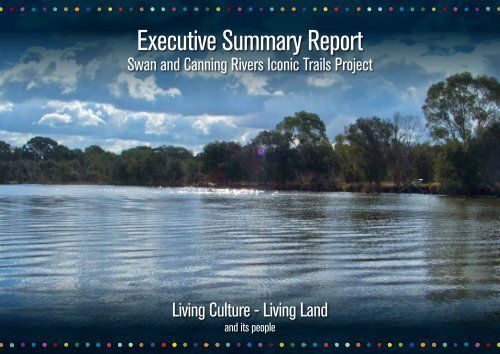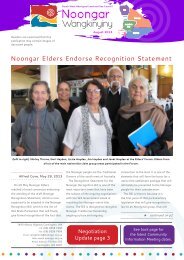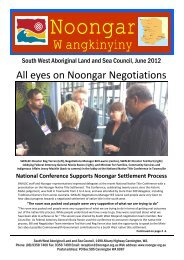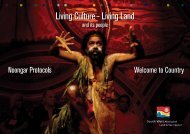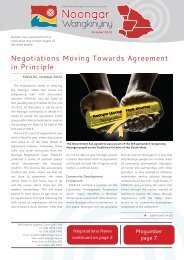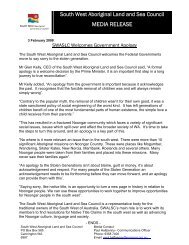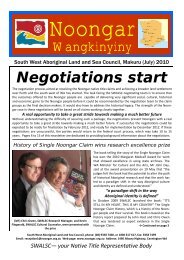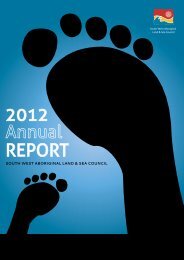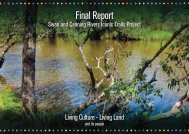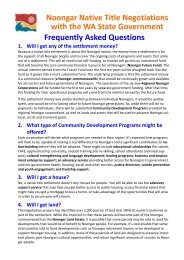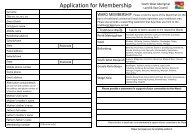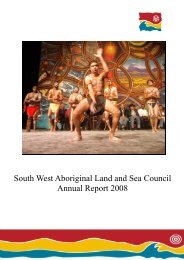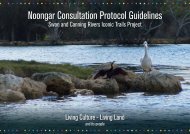Executive Summary Report - South West Aboriginal Land & Sea ...
Executive Summary Report - South West Aboriginal Land & Sea ...
Executive Summary Report - South West Aboriginal Land & Sea ...
- No tags were found...
You also want an ePaper? Increase the reach of your titles
YUMPU automatically turns print PDFs into web optimized ePapers that Google loves.
<strong>Executive</strong> <strong>Summary</strong> <strong>Report</strong>Swan and Canning Rivers Iconic Trails ProjectLiving Culture - Living <strong>Land</strong>and its people
Disclaimer1Disclaimer: The term Noongar (alternative spellingsinclude Nyungar, Nyoongar, Nyoongah, Nyungah,Nyugah, Yunga) is inclusive of all <strong>Aboriginal</strong> peoplein the <strong>South</strong> <strong>West</strong> region of <strong>West</strong>ern Australia.Throughout this report the term Noongar has beenused in accordance with the way in which the <strong>South</strong><strong>West</strong> <strong>Aboriginal</strong> <strong>Land</strong> and <strong>Sea</strong> Council refer to the<strong>Aboriginal</strong> people of the <strong>South</strong> <strong>West</strong> region.Similarly, the term ‘Waugul’ has many differentspellings, including Wagyl, Wagal and Wagul. In thisreport the term Waugul has been used for the sakeof consistency.Intellectual Property: Noongar knowledge belongsto the Noongar community, some knowledgebeing individually owned by families. All Noongarinformation provided through this project willremain the property of the Noongar community andshould not be used without the express consentof the appropriate Noongar community, family orindividual.Message from the Noongar community:This report is an expression of our heart felt feelings as Noongars.We have been extensively consulted over many years for our views and opinions,which are rarely considered because they don’t fit the mainstream perspective.Once consultation has finished we are once again left on the sidelines.This must stop. We are proud Noongar peoplewith credible knowledge and expertise.Our voice must be heard, acknowledged and respected.As Noongars we demand full and effective participation in all facets of life and this meansmeaningful engagement in all matters concerning the Derbarl Yerrigan and Djarlgarro Beelier.
<strong>Executive</strong> <strong>Summary</strong>2The Swan and Canning Rivers Iconic Trails Projectwas initiated and is coordinated by the SwanRiver Trust. As part of the project the <strong>South</strong> <strong>West</strong><strong>Aboriginal</strong> <strong>Land</strong> and <strong>Sea</strong> Council was asked tofacilitate the inclusion of Noongar values in thedevelopment of a network of interpretive trails alongthe Derbarl Yerrigan and Djarlgarro Beelier. The Trailaims to highlight Noongar, European and naturalheritage sites as well as identify any missing links inthe existing trail network.This is the first time that a project of this nature hasseriously engaged the Noongar community to heartheir voices and opinions and for the communityto express their values in caring for country on theriver system.Throughout this consultation process it becameclear to the <strong>South</strong> <strong>West</strong> <strong>Aboriginal</strong> <strong>Land</strong> and <strong>Sea</strong>Council that the Noongar community was verydissatisfied with the current management processesalong the Derbarl Yerrigan and Djarlgarro Beelier bythe relevant statutory authorities. These processesdo not include meaningful Noongar representationor allow for any Noongar expertise to be included inplanning, environmental management, monitoringor decision making.The project revealed there have been many yearsof frustration within the Noongar communityabout what they see as their lack of involvementin the management of one of their most significantheritage sites, which they hold in extremely highregard and have a cultural responsibility to care for.The report on this project therefore goes muchfurther than simply providing an outline of thevalues that Noongar people associate with theriver systems that should appear on the trails’signage. Rather, the report provides a fundamentalstarting point for improving Noongar participationin all matters relating to the Derbarl Yerrigan andDjarlgarro Beelier to ensure that Noongar expertiseis afforded the authority to positively influencepolicy and decision making.The following principles should guide futureNoongar engagement in all matters relating to theriver systems:• To be acknowledged as Noongar (not <strong>Aboriginal</strong>or Indigenous);• Meaningful participation (not tokenisticconsultation);• Inclusion of Noongar expertise in environmentalmanagement and related activities; and• Respect for Noongar cultural values of the riversystems.Ultimately, the Noongar community demandsmeaningful involvement in caring for the DerbarlYerrigan and Djarlgarro Beelier as well as theiractive participation in decision making, strategicplanning, environmental management, monitoringand related activities.
The Noongar Values Project3The <strong>South</strong> <strong>West</strong> <strong>Aboriginal</strong> <strong>Land</strong> and <strong>Sea</strong> Councilreceived funding from Lotterywest to undertake theNoongar values project, which aims to emphasisethe Noongar cultural heritage surrounding theDerbarl Yerrigan and Djarlgarro Beelier. TheProject also aims to significantly raise communityawareness of the various Noongar heritage valuesalong the rivers and contribute to an increasedunderstanding for residents and tourists of how andwhy it is important to care for Perth’s water ways.During stage one of the project, consultation hasbeen undertaken to enable the Noongar communityto identify places of significance along the DerbarlYerrigan and Djarlgarro Beelier and documentthe values and importance these places have forNoongar people. The project facilitated a respectfulengagement with Noongar families, and helpedto build relationships between Noongar familiesand the broad range of stakeholders in rivermanagement, including local and state governmentbodies and community-based natural resourcemanagement groups.The project has also enabled a positive andcollaborative partnership to be developed betweenthe <strong>South</strong> <strong>West</strong> <strong>Aboriginal</strong> <strong>Land</strong> and <strong>Sea</strong> Counciland a number of agencies and statutory authorities.In particular, valuable relationships have beendeveloped with the Swan River Trust, the C21 (the21 Local Governments along the Swan and CanningRivers), the Committee for Perth, the WA PlanningCommission, the Department of Indigenous Affairs,the Eastern Metropolitan Regional Council, PerthRegion NRM and the National Trust. The projecthas generated a surprising amount of interestfrom these main stakeholders and the <strong>South</strong> <strong>West</strong><strong>Aboriginal</strong> <strong>Land</strong> and <strong>Sea</strong> Council is keen for thiscollaborative partnership to continue.At the commencement of the project, a projectAdvisory Group was established that includedrepresentatives from the <strong>South</strong> <strong>West</strong> <strong>Aboriginal</strong><strong>Land</strong> and <strong>Sea</strong> Council, Perth Region NRM, theEastern Metropolitan Regional Council, Swan RiverTrust, the WA Planning Commission, Departmentof Indigenous Affairs, Committee for Perth,the C21 Councils and the National Trust. TheAdvisory Group has overseen the project from itscommencement.The <strong>South</strong> <strong>West</strong> <strong>Aboriginal</strong> <strong>Land</strong> and <strong>Sea</strong> Councilinvited the Noongar community to be part ofthe process through a number of consultationsthat included workshops, tours and one-on-oneinterviews during 2009 and 2010. Through theconsultations Noongar Elders imparted knowledge,told stories and gave information about significantsites along the river system. The consultationhas also provided the first step in layering theappropriate information and site identification toguide the development of the comprehensive RiversTrail for Perth.As well as this <strong>Executive</strong> <strong>Summary</strong>, a Full <strong>Report</strong>and Cultural Protocol Guidelines to guide furtherconsultation for the project have also beenproduced. All documentation will contributeto building more appropriate frameworks forengagement in natural and cultural resourcemanagement across the Perth region as well asNoongar country more broadly.The purpose of the values project has been toacknowledge and celebrate Noongar people andtheir history of spiritual and physical connectionto the Derbarl Yerrigan and Djarlgarro Beelier. Theproject ensured that the Noongar community alsohad the opportunity to input their values into majorprojects in the future that will leave a legacy forfuture generations to respect. The ultimate aim ofany project such as this is to secure the place ofthe Noongar community in contemporary society asa unique, credible, and knowledgeable group withculturally specific expertise and to be a key playerin all processes and decision making at the local,regional and national levels.Importantly, the first stage of the Project hasfacilitated a respectful engagement with NoongarElders and communities who can speak for countryalong the Derbarl Yerrigan and Djarlgarro Beelier.It acknowledged Noongar places and people,and critically, it enabled Noongar people to definehow significant places associated with the DerbarlYerrigan and Djarlgarro Beelier should be recognised.
4The Derbarl Yerrigan and Djarlgarro Beelier have astrong Noongar spiritual connection and epitomisethe sense of place for the Noongar people. Thesignificance of the Derbarl Yerrigan and DjarlgarroBeelier to the Noongar community cannot beunderestimated, nor should it be understated – thespirit of the river system is the running soul of theNoongar people living in its midst. The Noongarvalues project captured some of the stories of thecommunity, their lived as well as living experiencesand how significant events have altered the flowand life of the rivers and Noongar people.Waterways such as the Swan River literally andspiritually lie at the heart of Noongar culture.To ask the elders what they would like to seesignposted along the Derbarl Yerrigan andDjarlgarro Beelier evokes a lifetime of experiences;memories about life along the river, memories offamily, camping, yarning, fishing, passing on culture,and the laughter of kids. But it also raises memoriesof oppression, dispossession, and racism. Forthem to see the river now brings sadness – the riverhas deteriorated significantly due to pollutants,chemicals and lack of proper care.Since 1829, Noongars have been denied theircultural responsibility to care for the river system.Bureaucratic processes have ensured that theyremain at the very margins of decision making,with their involvement in river management keptto mere tokenism. Added to this, there is a senseof frustration that Noongars do not have access toparticular areas along the rivers for cultural reasonsto enable them to protect significant sites.The full report not only provides recommendationson the signage for the Iconic River Trails Project, italso makes a case for the greater involvement ofthe Noongar community in the decision making andmanagement of the Derbarl Yerrigan and DjarlgarroBeelier. The rivers are the icons – the very subject ofthe Swan and Canning Rivers Iconic Trails project.The ConsultationThroughout the consultation process, Noongarsraised many concerns in relation to the river system.These concerns included but are not limited to:• the right to access the river for cultural purposes;• the importance of water to Noongar women;• the strong community wide sentiment for thepreservation of cultural heritage along the riversystems;• the poor environmental state of the river;• the constant development along the rivers beingdetrimental to the health and well-being of therivers;• the need for more regulation of recreational boatson the river, including jet skis and speed boats;• the critical need for protocols to cover differentdevelopments;• the lack of acknowledgement and respect forNoongar heritage sites by Government.
5Noongar ValuesThrough the consultation, Noongars shared some ofthe values they associate with the Derbarl Yerriganand Djarlgarro Beelier. Noongar values tendedto focus on the environmental health of the riversystem as well as Noongar history and culture. Theriver system in its entirety is a significant heritagesite for the Noongar community and their culturalhistory insists they have a responsibility to care forit. One of their main concerns is that since the daysof colonisation Noongars have been locked out ofkey decision making in relation to the rivers andthis has prevented them from fulfilling their culturalobligations. It has only been over the last 20 yearsor so that Noongar people have even been affordedthe opportunity for even basic representation.The consultation highlighted the vast range ofcultural values attributed to the Swan and CanningRivers that should be highlighted on the signage ofthe Iconic Trail. These values can be separated intobroad categories that include:Sense of PlaceNoongar Culture:• Swan and Canning Rivers as significantheritage sites;• Mythological significance of the river (Waugul);• Dreaming trails that lie within the river;• Valuing the different areas of the river (men’splaces, women’s places, ceremonial grounds,etc);• Relationship to country.Acknowledgement:• Recognition of Noongar people as TraditionalOwners of the south-west region;• Recognition of Noongar culture;• Recognition of significant sites along the Swanand Canning rivers;• Recognition of traditional practices along theSwan and Canning rivers pre-settlement;• Recognition of a unique Noongar history –dispossession from the land, destructionof sites.Ecosystem Health - Environment:• Importance of the health of the river system toNoongar people;• Importance of protecting native flora and fauna.Community BenefitEducation:• Importance of providing educationalinformation about culture, traditions andhistory;• Importance of educating the wider communityabout the significance of the river system tothe Noongar community.Meaningful Participation and Engagement(empowerment):• Noongar involvement in the development ofriver management strategies;• Noongar involvement that ensures the culturalinterests, obligations and sites are protectedand acknowledged;Economic Benefit - Employment:• Training and employment for Noongar peoplein policy and management positions dealingwith the river system, i.e. Swan River Trust,Department of Environment and Conservationand Local Government;• Employment for Noongar people inenvironmental roles caring for the river system,i.e. rangers, land management etc;• Employment for Noongar people in educationroles that educate the public about Noongarculture and values, including the mentoringof Noongar youth to maintain culture andknowledge.
6Implementation andInstallation of SignageThe full report recommends that the signs along theIconic Trails should reflect Noongar values aboutthe river systems. Signs should include storiesabout Noongar culture, traditions and history aswell as cultural responsibilities. Signs should alsoreflect the concerns that were raised throughthe consultation in relation to the environmentaldegradation of the two rivers.The community indicated a number of possiblesignage locations as significant areas that holdstrong cultural value for Noongar people. However,this is a preliminary indication of where signageshould go and the report recommends that furtherconsultation must be undertaken to ensure othersites have not been missed and that all communitymembers are comfortable with those sites alreadyhighlighted.Key elements for the signage could include, but notbe limited to:Sense of Place:• Noongar artwork – a theme could be adopted forall signs along the trail;• Noongar place names;• Noongar Stories;• Historical photos of people and places (signageat Success Hill as an example);Ecosystem Health:• Environmental significance of the area to theNoongar community including bush tucker (ifacceptable);• Environmental protection responsibilities (lossof habitat for Carnaby Cockatoos, death of riverdolphins, pollution etc);Community Benefit:• Cultural and social significance for the Noongarcommunity;• Historical significance for the Noongarcommunity;Economic Benefit:• Initiatives undertaken in that specific areathat has included involvement of the Noongarcommunity, i.e. employment of Noongar riverrangers;It is recommended that signage could includeparticular stories, however where the informationis culturally sensitive, such as women’s stories, acultural custodian should be listed on the sign. Afinal list of signage criteria should be developedthrough the Advisory Group.The Full <strong>Report</strong>The Noongar Values <strong>Report</strong> is the result of acomprehensive consultation process about theIconic Trails Project. What sits behind the reporthowever is the positive result of a process thatcan not be articulated through any amount ofsignage along the shores of the Derbarl Yerriganand Djarlgarro Beelier. This project has not onlybrought people together it has provided the <strong>South</strong><strong>West</strong> <strong>Aboriginal</strong> <strong>Land</strong> and <strong>Sea</strong> Council with theopportunity to facilitate talks with members of thecommunity that have been distanced and alienatedthrough the arduous processes dictated by thenative title system. This signifies the depth of feelingthat Noongar people have for their river systemand waterways and the cultural responsibilities thatNoongar people have to care for them.The process of consultation has highlightedthe different values that Noongars place on therivers compared to the non-Noongar community.By way of example, but in no way a definitivecomparison, Noongar cultural heritage valuesrelate to family, family relationships, spiritual beliefsand the harmonious relationship between peopleand environment. Whilst non-Noongar heritagevalues relate to history, settlement of the SwanRiver colony and a moulding of the environment tobetter suit the values and needs of society. Thesedifferent value systems however, are not completelyincompatible with both Noongar and non-Noongar
7values converging on areas of recreational activityand environmental protection. The Iconic TrailsProject can highlight these differences andsimilarities in a positive manner.Through the project the <strong>South</strong> <strong>West</strong> <strong>Aboriginal</strong> <strong>Land</strong>and <strong>Sea</strong> Council has also succeeded in raisingawareness about Noongar culture in various forumsthroughout the metropolitan area. Members ofstaff were invited to participate in C21 meetings,they met with the Minister for Indigenous Affairsas well as senior staff from other Governmentdepartments and have been involved in a series ofpublicity articles on the Swan and Canning Rivers inCommunity Newspapers.The project has had surprisingly positive resultsin that it has facilitated the engagement of keystakeholders and raised awareness of Noongarinterest in the river system and their desire to befully engaged in processes and decision making.The collaborative relationships that have beendeveloped through this project should be harnessedand cultivated.The consultation has also revealed that Noongarsbelieve it is time to move beyond mere‘representation’ in processes throughout the southwestto more meaningful and active participation.Noongar involvement should be based on principlesof respect, acknowledgement and recognition, inparticular it should be remembered that Noongarvalues are cultural and spiritual and form the basisof life in harmony with the land. Such values caninform, educate and positively influence howdevelopments occur in and around the river.To this end, the Iconic Trails Project is providingan opportunity to influence and change the waybusiness is done in <strong>West</strong>ern Australia, not only bythe Swan River Trust, but also other governmentagencies, statutory authorities and even the privatesector. Meaningful participation means listening tothe Noongar community, respecting their valuesand opinions, and weaving Noongar culturalknowledge through the actions and activities ofgovernment.Noongar participation needs to occur on a multilayeredbasis. International principles should bebrought to bear on national, regional and localprocesses, Noongar participation should occur innational, regional and local decision-making andthe employment of Noongar people should occurat the grass roots level through State Governmentdepartments as well as local initiatives throughLocal Government.As well as the <strong>Report</strong>, this project has facilitated thedevelopment of Consultation Protocol Guidelinesthat, whilst specifically for the Swan River Trustand the next phases of the Iconic Trails Project,will form a draft document for further consultationthat will ultimately be adapted to cover the wholeof Noongar country. The Consultation ProtocolGuidelines will be used to form positive and lastingpartnerships with key stakeholders across the southwest of <strong>West</strong>ern Australia and galvanise the politicalempowerment of Noongar people and their place inAustralian society.The <strong>South</strong> <strong>West</strong> <strong>Aboriginal</strong> <strong>Land</strong> and <strong>Sea</strong> Councilwishes to thank all stakeholders that havecontributed to this project, most importantly theNoongar community, but also the Perth RegionNRM, the Swan River Trust, C21, Committee forPerth, the East Metropolitan Regional Council,the WA Planning Commission, the Department ofEnvironment and Conservation and the Departmentof Indigenous Affairs.
List of Recommendations8Sense of Place - Today1. That this consultation on the Noongar Nation,Noongar history, Noongar culture and Noongarvalues associated with the Swan and CanningRivers be used as the best practice templatefor future consultations with the Noongarcommunity to ensure Noongar input into caringfor country.2. That the Noongar Nation, Noongar history,Noongar culture and Noongar valuesassociated with the Swan and Canning Riversmust be acknowledged and respected.3. That Noongar history, Noongar culture andNoongar values associated with the Swan andCanning Rivers must be enshrined in policies,strategies and documentation developed on theriver systems.4. That the Noongar community, throughconsultation with the <strong>South</strong> <strong>West</strong> <strong>Aboriginal</strong><strong>Land</strong> and <strong>Sea</strong> Council in partnership with theSwan River Trust, must be fully involved in thedevelopment of a joint management strategyfor the protection of the river system.Concerns of the Community5. That a Noongar consultation group beformed to advise on design, use of language,interpretation and placement of signage forstage two of the project.6. That all community works along the riversystems be done in consultation with NoongarElders.7. That Welcome to Country ceremonies be doneby recognised Noongar Elders.8. That Government be advised that NoongarElders through this consultation process areconcerned with the waterfront development andits impact on the Swan River as a significantregistered heritage site.9. That a cultural Elders group be formed to ensureall heritage sites along the Swan and CanningRivers are registered and protected as moresites are identified.10. That the <strong>Aboriginal</strong> flag be flown at LocalGovernment buildings along the Swan andCanning Rivers and other sites including, butnot limited to, Parliament House, Kings Parkand the City of Perth.11. That the Beelier and all other wetlandsthroughout Noongar country are associatedwith Women’s Business and should beacknowledged and respected as women’s sites.12. That the Department for Environment andConservation and the Swan River Trust establishNoongar units within their operations.13. That the Department for Environment andConservation and the Swan River Trust reviewtheir policies and procedures and instigateamendments to legislation to ensure meaningfulNoongar participation and consultation.14. That the Department for Environment andConservation and the Swan River Trust allowsufficient time for culturally appropriate Noongargovernance processes.15. That the C21 Local Governments develop aMemorandum of Understanding with Noongarpeople, through SWALSC, to include Noongarknowledge, Noongar history and Noongarculture in activities and developments along theSwan and Canning Rivers.16. That a comprehensive consultation processwith the Noongar community be undertaken bythe Government in relation to the developmentof the Perth City foreshore and that aNoongar cultural centre remain as part of thedevelopment.17. That Noongar Elders be consulted on thedevelopment of a cultural education packageand for Noongar people to be trained todeliver cultural education to young Noongarpeople, schools, governments and appropriateindustries.18. That the Swan River Trust employ Noongar menand women for substantive positions throughoutthe organisation, including, but not limited topolicy, monitoring and ranger positions.
9Policy Context19. That the principles contained in the UNDeclaration on the Rights of IndigenousPeoples be enshrined in policies, processesand initiatives developed and implemented inand around the Swan and Canning Rivers aswell as for broader Noongar country.20. That water planning throughout the southwestof <strong>West</strong>ern Australia include Noongarrepresentation in a meaningful and effectiveway to ensure the incorporation of Noongarlanguage, social, spiritual and customaryobjectives.21. That the Noongar community is afforded fulland effective participation in the developmentof the Swan-Avon regional water plan with theDepartment of Water.22. That the Department of Indigenous Affairsensure full and effective participation indevelopment and works in and around theSwan and Canning Rivers including free,prior and informed consent for the Section 18approvals process.23. That a working partnership be developedwith the Department of Environment andConservation for the employment of Noongarmen and women, in particular young people, inenvironmental management in and around thePerth and south-west region.24. That SWALSC, in partnership with theDepartment of Environment and Conservation,the C21 Local Governments and the SwanRiver Trust, access funding to employ Noongarrangers and river managers along the Swan andCanning River system.25. That the Swan and Canning RiversManagement Act 2006 be amended to includespecific reference to Noongar people, inparticular the requirement for consultation withNoongar people about access to country.26. That the Swan River Trust include a NoongarTraditional Owner for the Swan-Canning areaon the Swan River Trust Board.27. That the Swan River Trust develop aMemorandum of Understanding with Noongarpeople, through SWALSC, to include culturalawareness training and the introduction ofpolicies for meaningful participation of theNoongar community in policy and decisionmaking.28. That the Swan River Trust establish a NoongarAdvisory Board to assist in the developmentof a holistic policy for the protection of theriver system. The panel should includeElders, women, men and young people with afunctioning secretariat.


